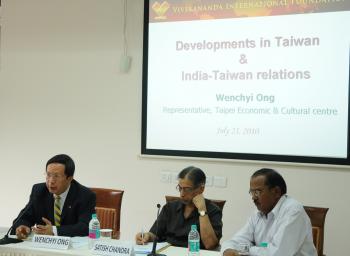Mr Wenchyi Ong, head of the Taipei Economic and Cultural Centre in New Delhi had a lively interaction on July 21st with a cross section of the Indian business community, security analysts, former diplomats, the academe and scholars at the Vivekananda International Foundation.
Initiating the discussion Mr Ong dwelt at length on the improving cross straits relationship, the evolution of India-Taiwan ties and the tremendous potential for a quantum jump in the economic and commercial relationship between the two.
On relations with the Peoples Republic of China, Mr Ong pointed out that over the last two years as many as 12 agreements had been concluded between it and Taiwan in diverse fields ranging from air and sea transport to combating crime and judicial assistance. This pragmatic approach on the two sides resulting in vastly increased engagement between them had culminated on June 29th 2010 in the signing of the Economic Cooperation Framework Agreement between them. This will promote the normalization of cross strait ties and the resulting peace dividend can be shared by neighbours like India.
Mr Ong, however, clarified that no time table had been set for political talks between the two countries and while engaging the Peoples Republic of China, Taiwan was conscious of the need to provide for risk management.
Mr Ong provided a graphic account of the evolution of India-Taiwan relations from the time of Chiang Kaishek including his visit to India in 1942. It was noted that the latter during his visit to India not only supported the cause of Indian autonomy but also interceded on India’s behalf with President Roosevelt. This empathy for India was also shared by President Ma following his visit to India as a private citizen in 2007. After he became President in 2008 he has urged that Taiwan should invest more in Indonesia and India.
It was generally recognized that India’s look east policy which had been initiated over two decades ago was incomplete for several years as it had overlooked the importance of establishing firmer economic, commercial and cultural links with Taiwan. Taiwan too had for long remained unfamiliar with India. Happily this neglect had been sought to be remedied from the mid 90’s and the process had built up a greater momentum in the last few years. Nevertheless much remained to be done as interaction between the two was far below its potential. For instance, India-Taiwan trade at the current level of $4 billion was only 1% of Taiwan’s total trade. Moreover, Taiwan’s cumulative investment was only $1 billion in India as against $10 billion in Malaysia, $20 billion in Vietnam and $300 billion in China.
It was acknowledged that India had much to gain from closer ties with Taiwan since it was an economic and technological powerhouse as exemplified by its $360 billion GDP, $350 billion foreign exchange reserves (4th globally), 293 patent filings per million of population (7th globally) and by its being the biggest manufacturer of wafer fabs, cellular phones, notebook computers etc.
Mr Ong underlined in considerable detail the efforts being made by him and his team in India to reduce the information gap between the two countries and to promote cultural and economic ties between them. He spoke at length about the possibility of tapping synergies between the two countries in information technology in the mutual interest. Specifically, he argued that there was a perfect fit between India and Taiwan with the former’s capabilities in the area of software and the latter’s strengths in the area of hardware. He also made the point that India by using cheaper Taiwanese manufactured components, which were used by most other international players, could develop its own branded electronic goods industry thereby obviating the need for effectuating costly imports in these fields.
In the area of education Mr Ong provided details of his efforts at promoting Chinese language training to Indian students in Taiwan. It was felt that this was an area where useful cooperation could be developed between his office and the Vivekananda International Foundation.



